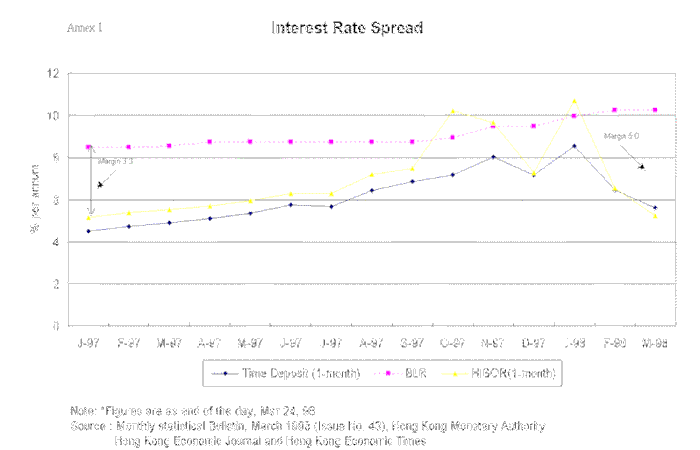The following is issued in response to media enquiries on the issue of the current interest rate margin :-
The Consumer Council has been watching closely the movement of the interest rate margin. The issue is related to the market structure of Hong Kong's banking sector and the Interest Rates Agreement which has only been partially liberalized. The Council believes that interest rates should best be determined freely by market forces.
The Council has noted the recent public concern over the current wide interest rate spread.
The Council's analysis has indicated a significant increase in the spread between the Best Lending Rate (BLR) and the Hong Kong Interbank Offer Rate (HIBOR) in March. The net interest margin (NIM) between BLR and HIBOR stood at 5% yesterday (March 24). (The attached graph explains).
Generally speaking, BLR affects the interest rates borrowers pay to banks while HIBOR affects the interest rates banks pay to raise fund for their business.
The BLR has been increased on several occasions rising from 8.75% last September to the current 10.25%.
Despite a continuous fall in the HIBOR in recent weeks, the BLR has remained unchanged at its current level prompting public call for a reduction of the BLR.
The Council realises that the relationship between different interest rates is complicated. However, the issue needs to be addressed with urgency as BLR effectively determines the interest rates of most mortgage loans.
The Council also notes with concern that under the present arrangements, any fall in BLR would be matched by a fall in the interest paid on savings accounts, which is not subject to the same competitive pressure as interest rates offered to depositors in accounts with 7 or more days.
Savings and deposit accounts with notice periods of less than 7 days are still set by agreement amongst the banks under the Interest Rates Agreement.
Thus, in the event of falling interest rates, mortgage borrowers would gain whilst bank depositors would stand to receive a lower return rate. In December 1997 the value of Hong Kong dollars saving deposits and mortgage loans for residential property amounted to HK$336,061 million and HK$480,233 million respectively.
The Council is in favour of the mortgage rates and deposit rates being freely determine by market forces. However, the existing Interest Rates Agreement prevents individual banks from determining their own deposit interest rates of below 7 days.
This clearly demonstrates the need for the complete liberalization of interest rates as recommended by the Consumer Council in its report " Are Hong Kong Depositors Fairly Treated ?" published in February 1994.
The Council has written to the Hong Kong Monetary Authority on the issue.



